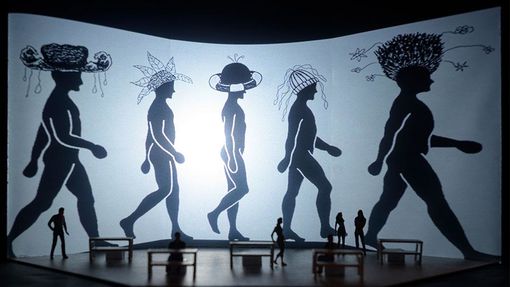Khadija Raza

Upon leaving Central in 2017, Design for Stage graduate, Khadija Raza, was announced that same year as one of the winners of the Linbury Prize, the UK’s most prestigious award for Stage Design. Since then, she has provided set and costume design for productions including Hijabi Monologues, Spun and Mixtape, and went on to win the The Stage’s Debut Award for Best Designer in 2018, distinguishing her as one of the most exciting emerging talents in her field. We spoke with Khadija to find out what she’s currently working on.
Why did you decide to study at Central, and why our Design for Stage course in particular?
I decided to come to Central because it’s one of the few places in the country that specifically offer a theatre design course. I felt like I could really learn exactly what I needed to and hone my skills and also thought that being in a drama school surrounded by all the different roles that you would normally encounter in a theatre would be a great experience to get used to that sense of collaboration from the start of my career.
Could you tell us a little about what you’re working on at the moment?
I’ve recently been working on a few projects; I opened a show called My White Best Friend (and other letters left unsaid) at the Bunker Theatre as part of a brilliant week long festival of newly commissioned writing. My show, an opera called Dido, for which I won the Linbury Prize in 2017, is also opening. In addition to this, I’m also working at the Young Vic, creating a devised piece with their neighbourhood company, and on a show that will open in the summer at the Guildhall School of Music and Drama.
How did the Design for Stage course help prepare you for the work you’ve been involved in since graduating?
The course at Central equipped me with all the technical skills I needed to do my work, such as technical drawing, model making, and Adobe Photoshop, all of which I use on a daily basis. Also, through the rigorous, and sometimes challenging, critiques from my tutors I learnt to constantly interrogate my choices as a designer and challenge others in the room as well.
Was there a single key moment/show/placement that stands out as the thing you learnt the most from?
I don’t think there was necessarily one defining moment, more a steady building of knowledge and confidence. In hindsight I can identify many moments during two student productions in my final year in which I learnt a lot about the pressures of the job and how to deal with those.
How crucial would you say networking has been for your career – and how has Central supported you in establishing your networks?
The theatre industry is an incredibly small world and I am constantly meeting people who trained at Central, and it’s always a great starting point to have that common ground. On my first day my Course Leader said that our peers would be the best network we will ever have and this has rung true. I’ve kept in touch with peers from across different courses and years, and they’ve been a great source of advice, and I’ve even been recommended for jobs by them.
Can you tell us about other work/projects you’ve worked on since graduating, and any moments that have stood out for you?
I coudn’t pick one! Winning the Linbury Prize was a wonderful moment to kick off my career, as well as winning the Stage Debut Award for best designer the following year. I have loved working on such a range of different projects with such different people and have truly been very lucky and am grateful.
What might a typical working day look like at the moment?
A typical day at the moment involves researching, sketching and model making for a few projects and coming up with ideas ahead of deadlines. In a few weeks I’ll be starting rehearsals for an opera and everything will change again!
What advice do you have for young people thinking about careers in Stage Design?
Theatre is such an exciting, expressive and truly creative industry. It can feel intimidating to step in to as it is competitive, but go and experience as much theatre as you can. Smaller, less expensive, fringe shows away from the West End can offer great examples of what theatre design can do and will help you find out what speaks to you.
“The theatre industry is an incredibly small world and I am constantly meeting people who trained at Central, and it’s always a great starting point.”

